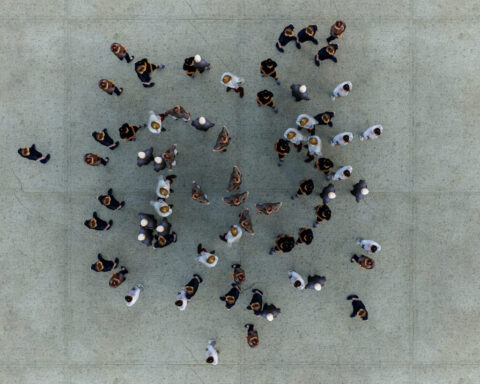The rise of digital communication in romance has enabled new forms of annoying dating behaviors. Enter "paperclipping" - when someone you briefly dated resurfaces out of the blue after months of silence to casually chat as nothing happened.
This pattern of disappearing post-dates only to follow up later leaves the recipient confused and irritated. Experts say despite the new name, paperclipping echoes immature relationship habits that predate apps. The difference is texting and social media now provide more tempting avenues for intermittent connection without commitment.
"Paperclipping represents an age-old dynamic of seeking validation through superficial contact," says psychologist Dr. Carla Manly. "But technology creates easier opportunities to disappear and then reappear on a whim."
Manly argues paperclipping typically stems from underlying personal insecurities. "It's generally a sign of emotional immaturity and inability to sustain meaningful bonds," she notes. "Out of fear of rejection, paperclippers pull away before intimacy develops."
These restless romantics grow bored and anxiously sabotage budding relationships. But their bruised egos still crave attention. After the dust settles, they circle back to previous conquests to satisfy their thirst for importance when lonely.
"They randomly reappear just to feel validated by provoking any reaction," Manly explains. "But they never stick around long enough to experience actual connection." She believes their behavior damages both parties.
The abrupt broken contact leaves former dates feeling hurt, irritated, and disrespected. Having affection withdrawn for no reason damages self-esteem. The paperclipper also suffers from losing out on rewarding relationships by self-fulfilling worries of abandonment.
Manly considers paperclipping a form of "using others as objects" to nourish fragile egos. Casually popping in and out of people's lives for an ego boost demonstrates indifference to others' feelings.
Researchers note these poor relationship skills often stem from attachment issues rooted in childhood. Psychologist Dr. Elisabeth Goldberg blames "emotional unavailability or instability of caregivers" in development for later interpersonal struggles.
Goldberg says inconsistent nurturing causes shaky self-worth and dysfunctional relating in adulthood. Adults who lacked secure loving bonds as kids often reflexively push others away or cling desperately out of skewed inner working models.
But psychologist Dr. Wyatt Fisher argues society also shoulders blame for normalizing such shallow relating in the digital age. "Technology promotes treating people as disposable and interchangeable," he laments. "This hampers meaningful intimacy."
Dating coach Damona Hoffman agrees apps facilitate bad behavior by presenting people as products, not humans seeking connection. The illusion of endless romantic choice breeds commitment-phobia.
"Online dating puts you in the mentality of seeking ideal traits in others like checking off a grocery list," Hoffman explains. "This commoditizes the search for love into box-checking."
Hoffman advises introspection to avoid falling into paperclipping habits. "Focus less on superficial wants and more on core emotional needs," she counsels.
Others suggest approaches to discourage paperclippers' fickle attention-seeking. "Do not respond to their messages," urges therapist Megan Cannon. "Reacting feeds their underlying motivations."
Cannon believes the most effective deterrent is ceasing all contact. "Withholding the desired response or emotion starves them of the validation they crave," she says. "It forces paperclippers to seek ego boosts elsewhere."
But Manly contends paperclippers rarely reform without therapy addressing root insecurities. "Facing rejection may motivate change if it causes enough pain," she notes.
Philosopher Alain de Botton argues society should develop greater empathy for people's emotional blind spots. He believes listening and guidance do more good than judgment or rejection.
"Petty cruelties often arise from secret fears and wounds," Botton writes. "With compassion we can help others grow."
Some defend occasional paperclipping as harmless fun versus malicious manipulation. But most experts maintain it still objectifies people and promotes disposability.
"Flitting in and out of lives when convenient demonstrates selfishness and poor character," asserts psychologist Dr. Kevin Gilliland.
Journalist Taylor Lorenz attributes paperclipping's prevalence to social media conditioning people to treat connections casually.
"Apps make maintaining loose ties effortless," Lorenz writes. "This acclimates users to dive in and out of intimacy."
But while technology enables paperclipping, the motivations behind it appear timeless. Therapists largely concur selfishness, insecurity and discomfort with emotional closeness drive the behavior.
And what should you do if a past paramour randomly resurfaces months later with a blithe "Hey stranger!" text?
Dedicated paperclippers likely won't change without counseling insight. But experts agree you control whether to indulge their fickle games.
"The healthiest response is no response," says Cannon. "Resist replying without hostility or emotion. Polite detachment sends the clearest signal."
You owe no one an explanation for choosing to ignore attempts to paperclip your heart. But if stating boundaries directly eases your conscience, Manly suggests a simple text:
"I'm unable to engage further. Please don't contact me again. Best wishes."
With digital dates, we must guard against normalizing callousness and incivility. Technologies crossing our path can enrich lives yet also enable hurting others at a safe distance. But human decency stays our choice, if we listen to angels of our better nature.

 Trump has begun another trade war. Here's a timeline of how we got here
Trump has begun another trade war. Here's a timeline of how we got here
 Canada's leader laments lost friendship with US in town that sheltered stranded Americans after 9/11
Canada's leader laments lost friendship with US in town that sheltered stranded Americans after 9/11
 Chinese EV giant BYD's fourth-quarter profit leaps 73%
Chinese EV giant BYD's fourth-quarter profit leaps 73%
 You're an American in another land? Prepare to talk about the why and how of Trump 2.0
You're an American in another land? Prepare to talk about the why and how of Trump 2.0
 Chalk talk: Star power, top teams and No. 5 seeds headline the women's March Madness Sweet 16
Chalk talk: Star power, top teams and No. 5 seeds headline the women's March Madness Sweet 16
 Purdue returns to Sweet 16 with 76-62 win over McNeese in March Madness
Purdue returns to Sweet 16 with 76-62 win over McNeese in March Madness








